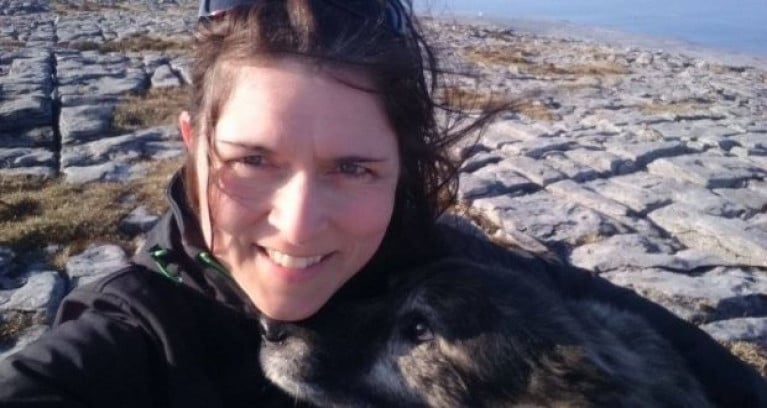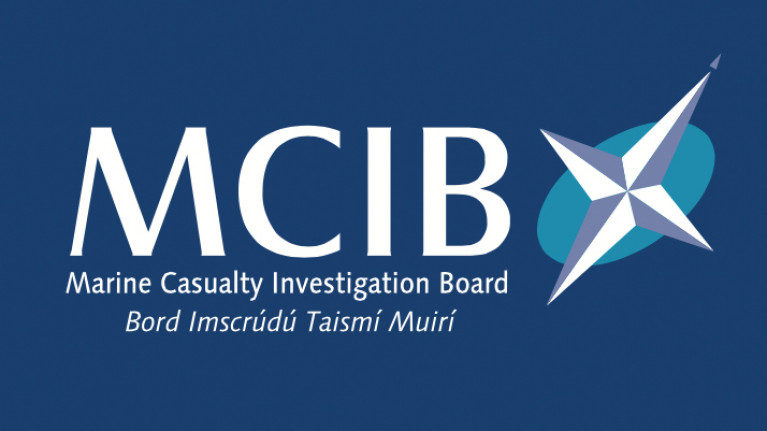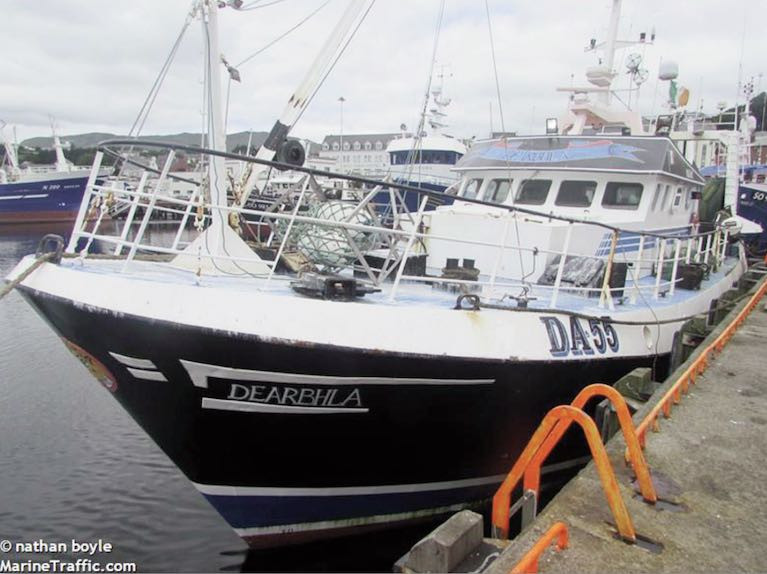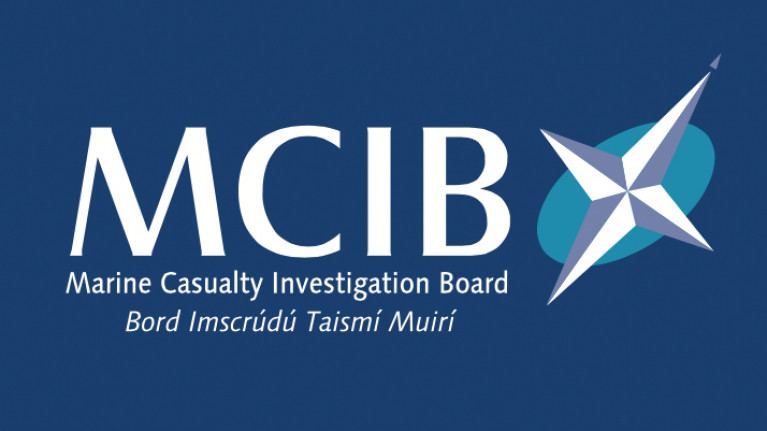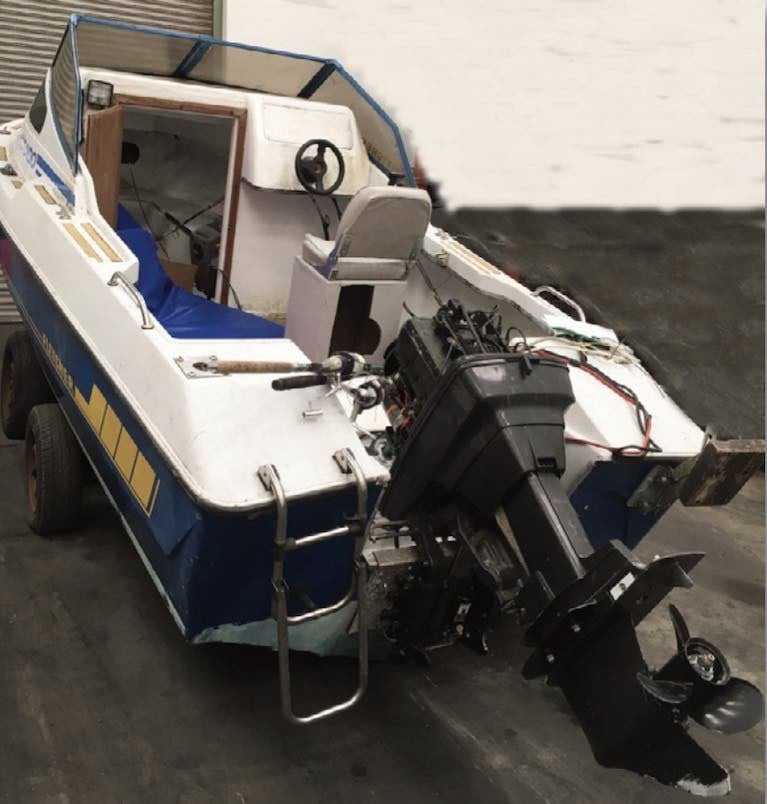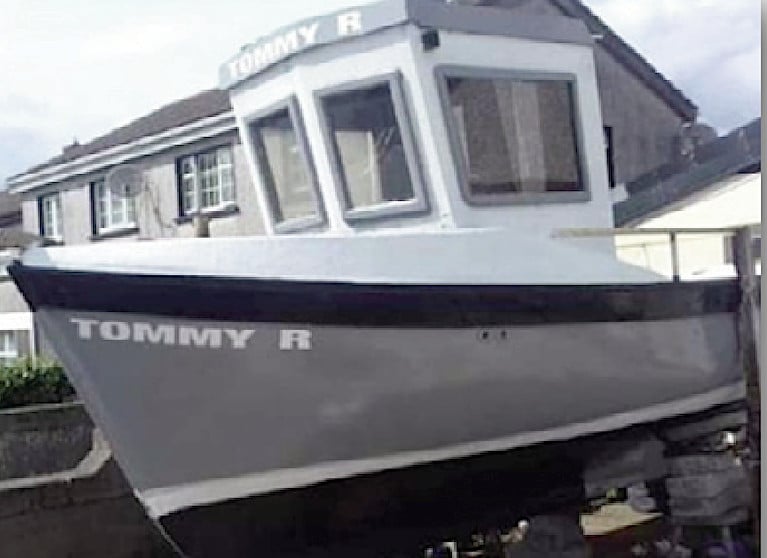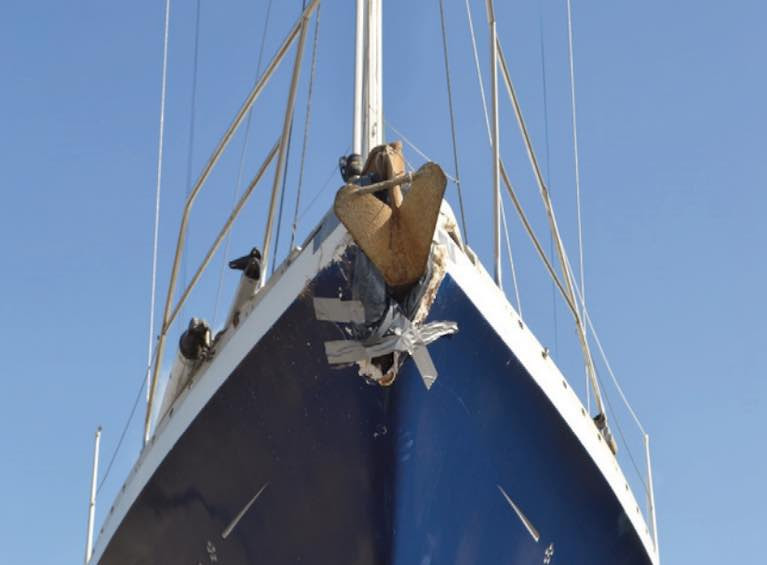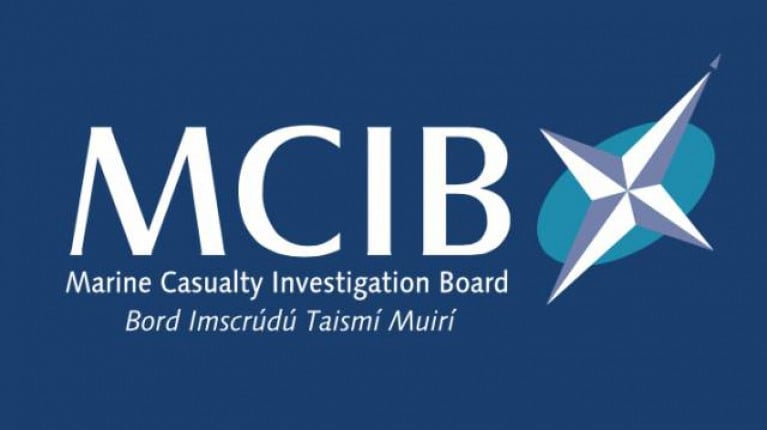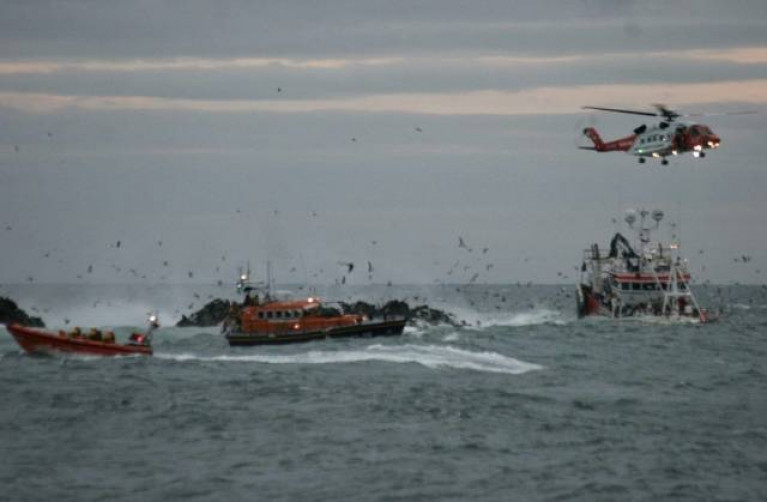Displaying items by tag: MCIB
Bernard Lucas Calls for Reinvestigation into Death of His Wife & Irish Coast Guard Volunteer Caitriona Lucas
Irish Coast Guard volunteer Bernard Lucas has called for a re-investigation into the cause of his wife Caitriona’s death off the Clare coast in 2016.
In an interview with today’s Sunday Independent, Mr Lucas says he finds as “shocking” the criticisms of the Marine Casualty Investigation Board (MCIB) in a report commissioned by maritime lawyer Michael Kingston.
The report by Capt Neil Forde of Marine Hazard Ltd said the MCIB was “not fit for purpose”.
It was submitted by Mr Michael Kingston to several Oireachtas committees, including the Transport and Communications Network committee which sat on Friday last.
Ms Lucas (41), a librarian, mother of two, and advanced coxswain, had offered to help out the neighbouring Irish Coast Guard Kilkee unit in a search for a missing man on September 12th, 2016.
She hadn’t expected to go to sea, but the unit was short a crew member. She died after the Kilkee rigid inflatable boat (Rib) capsized in a shallow surf zone. Two other crew members survived.
Last summer, the Director of Public Prosecutions (DPP) decided that no criminal charges should be brought in relation to the incident after a report was forwarded to it by the Health and Safety Authority (HSA).
The unpublished HSA report was one of two separate investigations. The second report by the Marine Casualty Investigation Board (MCIB) proved so contentious that it had to be published in two parts, and the responses to the draft were longer than the report itself.
In a robust response, the Irish Coast Guard described the MCIB report as “flawed” and “misleading”, and argued that it was a “significant leap” to draw wider conclusions about safety standards based on one “tragic accident”.
In his submission to the draft report, Bernard Lucas queried why the investigation did not address failure to find personal locator beacons and other equipment issues, including the loss of helmets by three crew and the failure of lifejackets to inflate.
A postmortem identified a trauma to the side of Ms Lucas’s head at a point where it should have been protected by her helmet.
Last summer, the MCIB’s authority was questioned in a European Court of Justice judgment which found it is not independent as its board included the Department of Transport secretary-general, or his or her deputy, and the Marine Survey Office (MSO) chief surveyor. These two post holders have recently stood down.
The report commissioned by Mr Kingston claims the MCIB failed to investigate certain incidents which it has a statutory duty to inquire about, it questions its resources and independence.
It also says the MCIB inquiry into Caitriona Lucas’s death is “riddled with inaccuracies” – starting with the wrong location for the incident.
These inaccuracies were not corrected, even when highlighted in responses to the draft report, because MCIB investigators” simply have not had the resources required to do the job properly”, Mr Kingston told the Oireachtas Transport and Communications Networks committee hearing on Friday.
Capt Forde’s analysis also questions why the MCIB did not also investigate a previous incident which occurred in similar circumstances to that of Ms Lucas’s death, where an Irish Coast Guard Dingle unit RIB capsized in a surf zone off Inch, Co Kerry in August 2014.
The MCIB said in response that it does not comment on published reports issued on the conclusion of investigations, and said it was not the purpose of an investigation to attribute blame or fault – but to avoid other casualties occurring.
“Any person may report a marine accident to the MCIB directly and details are on the website,”it said in response to questions about its failure to follow up on the Dingle incident.
“All on-going investigations are noted on the website and members of the public may submit evidence about an investigation at any time should they so wish,” it said.
“The board may also re open investigations where it receives evidence to warrant that course of action,” it said, but it was “not in receipt of any requests to re-open any investigation, nor is it in receipt of any objections by any interested parties to the recommendations it has made”.
“The members of the MCIB recognise that some investigations arise from very tragic circumstances and that any investigation may cause added distress,” it said.
Read more on the Sunday Independent here
Minister for Transport Eamon Ryan says he plans a review of how marine accidents are investigated which should take “several months”.
Addressing an Oireachtas Transport and Networks Communications committee on Friday (Jan 29), Mr Ryan said that the the “fundamental review” would be conducted by an independent expert.
The review would examine “the structures in place for marine accident investigation”, how it is structured overseas and how “other modes” are treated in Ireland, he said.
“This is by no means a criticism of the Marine Casualty Investigation Board (MCIB) and its members past and present, its secretariat or its investigators and the valuable work they have undertaken,” Mr Ryan said
“However, circumstances have changed since the Policy Review Group’s 1998 report and the enactment of the 2000 Act and in light of the European Court of Justice judgment, I consider it to be an opportune time to have such a review,” he said.
“The review will look at how maritime accident investigation is structured overseas and also how other modes are treated in Ireland,” he said.
Last year, the European Court of Justice found that the MCIB was not independent, as its board included the Department of Transport secretary-general, or his or her deputy, and the Marine Survey Office (MSO) chief surveyor.
These two post holders resigned last year.
However, a report to the Oireachtas committee earlier this month by maritime lawyer Michael Kingston said the MCIB was “not fit for purpose”, stating it was under-resourced and had failed to conduct a number of investigations which it was statutorily obliged to.
At Friday’s committee hearing, Mr Ryan rejected a call by Mr Kingston for the immediate establishment of an independent investigation unit into marine accidents with adequate resources.
Mr Kingston, whose father Tim died in the Whiddy Island Betelgeuse explosion in 1979, pointed out a review had already taken place in 1998 with recommendations, and another review would only delay matters.
Mr Kingston said lessons needed to be learned from marine accidents, and this required a properly resourced investigation unit which might cost €350,000.
He said it would be a fraction of the cost of a €50 million annual search and rescue helicopter contract.
His call was supported by Fine Gael TD for Clare Joe Carey, Fianna Fáil senator Timmy Dooley and Green Party TD Steven Matthews who urged Ryan to take more immediate action than commissioning another review which might be “long-fingered”.
Mr Ryan said that he intended to proceed with amendments to the Merchant Shipping (Investigation of Marine Casualties) (Amendment) Bill 2020, which would involve reconstituting the MCIB board.
He said that the 1998 review was no longer sufficient, and further legislation could be introduced after a review took place.
Mr Ryan said the Merchant Shipping (Investigation of Marine Casualties) (Amendment) Bill 2020 should be” viewed as a transitional measure and not a permanent legislative framework for marine accident investigation in the State”.
“Further legislation may be required following completion of the review,” he said.
“Pending the outcome of the Review, it is imperative that the State continues to have a functioning marine investigation body in place,” he said.
MCIB ’Not Fit for Purpose’ Claims Report from Maritime Consultants
A new report submitted to the Oireachtas has slammed the Marine Casualty Investigation Board (MCIB) as “not fit for purpose”, according to the Irish Examiner.
Capt Neil Forde of maritime consultancy Marine Hazard Ltd claims that the MCIB has not been investigating certain matters for which it had a statutory duty.
These include as serious incidents in which people entered the water while boarding or alighting from vessels moored alongside.
Capt Forde — who last year suggested the appointment of a Secretary of Sate’s Representative to deal with major maritime or shipping incidents — added that the board should also take greater involvement in regulating leisure craft, such as establishing a minimum standard of training for operating such vessels.
Last September two civil servants stepped down from the MCIB following a ruling by the European Court of Justice found that it lacked independence.
The Irish Examiner has more on the story HERE.
Teamaker in Wheelhouse Could Have Averted Potentially Serious Grounding, Report Finds
A potentially serious incident involving a fishing vessel in Kerry’s Blasket Sound could have been avoided if there were adequate facilities in the wheelhouse to make hot drinks, a report has found.
Five crew onboard the 23m trawler Dearbhla had a narrow escape, when their vessel struck rocks off the north-west of Inis na Bró in the Blaskets on May 14th last.
The skipper was able to manoeuvre the vessel into deeper water, but it was found to have sustained substantial damage on its stern and under the bow when it was examined later in Bere Island Boatyard, Co Cork.
The Dearbhlá was on its way from Ros-a-Mhil, Co Galway to Howth, Co Dublin via the Kerry coast with a relief skipper when the incident occurred at about 4.10 am on May 14th.
The Marine Casualty Investigation Board (MCIB) report into the incident records that there was a moderate northerly breeze when the vessel left Ros-a-Mhíl on the evening of May 13th, decreasing to light winds with good visibility and slight sea state.
The vessel was northwest of Sybil Point at 3 am when the skipper called a crewmember, named “A” in the report, to take over the wheelhouse watch and instructed him to proceed through Blasket Sound.
The skipper had gone to his bunk when crew member “A” changed course and then went to the tea station in the crew mess to make a cup of tea
Before leaving the wheelhouse, he switched off the watchkeeper alarm, which is timed to give an audible sound every ten minutes to ensure the watchkeeper remains alert.
The crewman forgot to turn back on the watch alarm when he returned with his tea, and fell asleep shortly after. There was no one else on the bridge, and the bridge watch alarm was switched off also.
The vessel was on autopilot, and making a speed of 8.7 knots, but a course change was required before it reached the Blasket island of Inis na Bró.
When the fishing grounded on rocks on the northwest peninsula of Inis na Bró, the skipper was called immediately and the crew alerted
The report says the skipper manoeuvred the fishing vessel away from the rocks, and the crew investigated the damage – establishing that there was no water ingress, and no vibration felt from the propulsion system.
As the skipper didn’t think the vessel was in danger, the emergency services were not alerted, and he continued at reduced speed while a continuous assessment was made
After the skipper contacted the owner at 8 am, the vessel was re-routed to Berehaven for inspection and damage assessment at Bere Island Boatyard, arriving at 9am.
On May 15th, the vessel was inspected by a Marine Survey Office (MSO) surveyor, who detained it on the grounds of the damage to the bow and stem and expired certification.
The MCIB report says that “by falling asleep whilst on watch in the wheelhouse, the watchkeeper did not make the necessary course alteration to keep the vessel in safe and navigable waters”
It says the incident may have been averted if the required course change to navigate Blasket Sound safely was better supervised, and if there were adequate facilities in the wheelhouse to make beverages and allow watchkeepers to take light refreshments
It also says it may have been averted if the watchkeeper alarm panel keyed switch facility had been used as intended by its designer.
It says that “no evidence was provided demonstrating that the crew had received adequate training to reduce the risks of endangering the health and safety of the crew or preventing accidents”.
It recommends the Minister for Transport should remind owners and operators of fishing vessels of the need for training under the Merchant Shipping (Safety of Fishing Vessels) (15 – 24 metres) Regulations 2007, particularly relating to health and safety and accident prevention.
It also says the minister should remind owners and operators of the obligation to notify the MSO Chief Surveyor when a vessel has been involved in a marine casualty.
It recommends the minister issue a marine notice to remind vessel owners and operators to ensure “all navigation is planned in adequate detail, and that passage plans, with contingency plans where appropriate, are compiled and made known to the crew”.
These contingency plans and procedures should include provision for a grounding event or collision incident, it says.
Download the full report here.
Drowning Incidents Prompt Marine Notice Highlighting Dangers of Boating Single-Handed & Without Lifejacket
The latest Marine Notice from the Department of Transport draws attention to the Code of Practice for the Safe Operation of Recreational Craft, following two recent reports from the Marine Casualty Investigation Board (MCIB).
In October, the MCIB’s report into the death of a long West Cork fisherman 12 months previously suggested that he may have fallen overboard from this open-deck vessel.
As previously reported on Afloat.ie, the MCIB determined that 23-year-old Kodie Healy was not wearing a lifejacket or personal flotation device (PFD) prior to the indecent in Dunmanus Bay on 9 October 2019 — and he may not have been aware of a personal locator beacon on his vessel.
September’s report into an incident on Lough Mask in March 2019 also found that the individual involved was not wearing a lifejacket.
The MCIB was unable to establish the cause of the incident on 8 March in which the 78-year-old experienced angler drowned. But the fact his boat was found upright suggests he had fallen overboard and was unable to get back into his boat.
Marine Notice No 58 of 2020 (available to download below) highlights to all operators of recreational craft the important of abiding by legal requirements to wear a PFD while on board an open craft (or on the deck of decked craft) under seven meres in length.
As well as reminding boaters to ensure they check current weather forecasts and sea/lake/river conditions prior to departure, the notice also underscores the increased risks involved in single-handed boating.
Boaters should carry out a risk assessment to minimise the inherent risks involved when setting out single-handed without any colleagues to help or raise the alarm when in difficulty.
The Code of Practice is a free download from the Department of Transport website. Hard copies are also available on request, in both English and Irish, from the Marine Safety Policy Division at [email protected]
MCIB Report Identifies Lack of Planning & Communication Difficulties in Report on Deaths of Two Men in Sea Angling Incident off Donegal
Lack of sufficient planning and lack of adequate emergency communication were factors in an incident where two of three men on a sea angling trip lost their lives off the Donegal coast over two years ago.
“Restrictive” procedures with the Emergency Call Answering Service (ECAS) also meant the men on board the vessel were in the water for five hours before the alarm was raised, the Marine Casualty Investigation Board (MCIB) report has found.
Two drafts of the MCIB report were circulated as part of a comprehensive investigation into the deaths of Gerry 'Malin' Doherty, who was in his sixties, and Thomas Weir (16) off Portronan, north Donegal, on July 17th, 2018.
A third man who is in his late 40s, survived after he clung onto a buoy for five hours before being spotted and brought to safety. He was the only one of the three wearing a personal flotation device.
The three had set out on a 5.9m (19 ft) glass-reinforced plastic craft from Port Ronan pier around 9 am that morning, and fished for over an hour. They were unable to restart the engine, and a wave washed over the hull and capsized it.
The report finds that seven factors contributed to the severity of the incident including the fact that the boat was anchored from the stern, making it more susceptible to being swamped in “any type of sea”.
The MCIB report notes that a crew member tried to make an emergency call on a British mobile phone, but as the call was being put through the phone fell into the water. There was no VHF radio onboard.
The emergency call was received by the ECAS centre but the report says that “restrictive procedures” were “not sufficiently flexible for a situation which required the ECAS operators to be more proactive in transferring all the information available to the Coast Guard”.
“Because the information in the recording of the emergency call was not transferred shortly after 10:16 hrs. the casualties were in the water for five hours,”the report says, and “this increased the severity of the incident”.
Marine communications are very different from land-based communications and the ECAS system is a land-based emergency call answering system with limitations for use at sea.
The MCIB report says that a mobile phone should not be relied on as the primary method of contacting emergency services and says that VHF radio as the primary means of contacting emergency services should be used by all boat owners in all instances, including in competitive sailing events.
The MCIB says that since the incident, the Irish Coast Guard has protocols in place for handling emergency calls and ECAS has also “updated policies.
However, it says that the Minister for Climate Action, Communication Networks and Transport should consider whether the Irish Coast Guard and ECAS “should have these policies, their implementation internally, and their coordination with each other, suitably reviewed and or audited”.
The MCIB report is here
Young West Cork Fisherman Who Died Last Year May Have "Fallen Overboard", MCIB Report States
An investigation into the death of the young west Cork fisherman Kodie Healy in Dunmanus Bay last year says he may have fallen overboard his boat.
The Marine Casualty Investigation Board (MCIB) report published today says Mr Healy had only bought the boat three to four weeks before the incident on October 9th, 2019.
The 23-year-old man was a trained and experienced commercial fisherman and was on a day off when he went fishing for mackerel and pollack in the 5.7-metre open deck GRP vessel Tommy R
He was not wearing a lifejacket or personal flotation device (PFD), and the report notes that he may not have known that there was a satellite personal locator beacon (PLB) onboard the vessel.
The hull was not found, but wreckage was picked up widely, and his body was located by divers north-west of Carbery island in a gulley or crevice in 11 metres of water on October 13th.
There had been an extensive search for Mr Healy, after he was reported overdue by his father, John Healy - from a well known west Cork fishing family - on the evening of October 9th last year.
An autopsy identified death by acute cardio-respiratory failure due to drowning.
The MCIB report concludes that “the most probable cause” of his death was that he fell overboard sometime after 1 pm when close to the northwest shore of Carbery Island.
“The ‘Tommy R’ steering would have been uncontrolled and the boat would have come into close proximity of the Carbery breaker or the seas northwest of Carbery island,” the report says.
The boat would then have been “overwhelmed, broken up and sunk by a breaking sea”.
Contributory factors identified by the MCIB include adverse weather, with a small craft warning and rough seas in Dunmanus Bay.; and the fact that Mr Healy was not wearing a PFD.
The report says he was fishing “on his own in very dangerous seas off Carbery breaker and Carbery island”, and the vessel was not suitable for those sea conditions on that day.
The qualified commercial fisherman who trained at the National Fisheries College, Castletownbere had left to fish in Dunmanus Bay at 8 am on that morning,
The Irish Coast Guard, RNLI, Naval Service, West Cork Underwater Search and Rescue dive team and Blackwater SAR Daunt and Cork Sub Aqua were among units involved in the extensive search.
Shortly before 10 pm that first night, boat wreckage was found at Drishane point on the Dunmanus peninsula.
The report says that the Tommy R was previously a fishing vessel named the FV Jamie Andrea, and was removed from the fishing vessel register by application in August 2017. As a recreational craft, it was exempt with compliance with the EU directive on fishing vessels of this size.
It says that “from the type and condition of the wreckage, it may be deduced that the boat’s sinking was rapid leaving little time for the casualty, if he was on board and not incapacitated, to send out a distress signal, call for help, grab a lifesaving device or prepare to abandon the boat”.
The report says Mr Healy used the boat for recreational fishing on several occasions prior to the incident.
The boat, built-in 1983, had declarations of compliance, with stability declared as satisfactory.
There was no record of a VHF licence, but the radio was reported to be working. However, there was no reported VHF communication from the vessel.
The report says Mr Healy intended to use a dive board method - a device with several fish lures attached which is trolled at the end of a line behind a boat moving slowly forward at around two to three knots.
In correspondence, Mr Healy’s father John included a number of omissions in the draft report.
Mr Healy said his son was a very experienced seaman, having fished from the age of seven and in waters from “Rockall to the English Channel” in later years.
“Personally, I believe that without more sightings of the boat on that day or, ideally, having the GPS tracker for that day, it is fair and reasonable to say at this time that only the sea holds the mystery of what happened,” Mr Healy wrote.
Airline Pilots on Yacht Which Collided with Tanker off Greystones
Two airline pilots on board a yacht which collided with a tanker off Greystones in the Irish Sea last year have disputed criticism of their experience in a report by the Marine Casualty Investigation Board (MCIB).
The MCIB inquiry into the collision between the 11.7m (38 ft) yacht Medi Mode and the 88m chemical tanker Varkan Ege on the night of August 23rd, 2019 highlights issues with some of the actions taken by both vessels.
The yacht was extensively damaged but was able to make its way to port, and there were no injuries and no pollution caused in the incident.
 Damage to hull, starboard side Photo: courtesy MCIB
Damage to hull, starboard side Photo: courtesy MCIB
However, the MCIB - which does not apportion blame or fault in its reports - calls on the Minister for Transport to alert recreational sailors and motorboat users to the need for “appropriate training” and compliance with international regulations on prevention of collisions at sea.
The event occurred in three miles east of Greystones at night, but with good visibility and good weather.
The Moody class yacht was en route to its home port of Howth, Co Dublin, and the chemical tanker registered in Turkey was on passage from Dublin to Falmouth, England.
 Tanker ‘Varkan Ege' Photo: courtesy MCIB
Tanker ‘Varkan Ege' Photo: courtesy MCIB
A “close quarters situation” and subsequent collision occurred at 02.22 hours.
The tanker stayed with the yacht to ensure it did not need assistance. It made its way to Greystones harbour.
The MCIB report says that the tanker reported seeing a red or port side light some 1.5 nautical miles away, and six minutes before the collision.
 A demonstration of the incident contained in the MCIB report
A demonstration of the incident contained in the MCIB report
It says the ship altered course to starboard four minutes before the collision. It also reduced speed and used “sound signal” to request the yacht to indicate its intentions.
The yacht had believed no risk of collision existed as the navigational warning lights on both vessels were “green to green” or starboard to starboard.
The yacht was unaware its own light was showing “red”, due to yawing of its mast from a following wind.
The yacht kept its course and speed in the belief that the tanker would pass clear on its starboard side, the report states.
While the report says the tanker “complied with efforts to avoid a collision when it became apparent that collision was possible”, it is critical of the fact that the tanker tried – unsuccessfully - to communicate via VHF radio with the sailing vessel when it was so close.
“This wasted valuable time when an immediate alteration of course to starboard may have been sufficient to avoid collision,” the report states.
It says that the two crew members of the yacht Medi Mode- who are not named in the report - had “many years’ experience of sailing” but they “had no formal marine navigation training”.
“They had no recognised course on the Collision Regulations (COLREGS),”the report says, noting “this was a contributory factor particularly in relation to International Regulations for Preventing Collisions at Sea 1972“.
In a response to the report, a representative of the yacht acknowledges that both crew did not have formal qualification in marine navigation.
It states that as “professionally qualified airline pilots of considerable experience, we are both well-grounded in the aviation COLREGS” or collision regulations”.
The letter says that these aviation collision regulations are “very similar to those pertaining to the marine, with an added third dimension”.
Under collision regulations, a power-driven vessel “shall keep out of the way of a sailing vessel”, but the report says that the yacht was not a sailing vessel in this situation as “both engine and sails were being used for propulsion”.
The report notes that the tanker claims it observed the yacht altering its course to port just before the collision, but the yacht says it kept its course. It says this cannot be determined definitively, as the yacht did not have the technology to record this.
However, the two vessels were on a collision course before it happened, the MCIB says, with the prow of the yacht striking the port bow of the tanker.
The report says the tanker’s speed was 7.5 knots and the yacht had a speed of 7.9 knots.
The report says that “both vessels should have observed each other and avoided a close-quarters situation developing”, where vessels are dangerously close.
It says the yacht should have seen the tanker’s lights at a range of six miles, and the tanker should have observed the yacht lights at a range of one mile.
It says the report by the master of the Varkan Ege tanker does not indicate there was a lookout on the bridge at the time of the collision but does state that the “lookout kept an eye of the sailing vessel”.
It also notes a “conflict” in the information provided by the master and the watchkeeper on the tanker.
It notes that neither vessel took compass bearings of each other to determine if there was a risk of collision.
The report says that “tiredness and fatigue cannot be completely ruled out as a contributing factor in the collision”.
The report recommends a marine notice highlighting the requirements in chapter two of the code of practise on the safe operation of recreational craft be issued by the Minister for Transport.
It says that “in particular, attention should be drawn to” the section on the need to undertake “appropriate” training in sailing and motorboat activities, and on compliance with the International Regulations for Preventing Collisions at Sea (1972).
Two Civil Servants Step Down from Marine Casualty Investigation Board
Two civil servants have stepped down from the Marine Casualty Investigation Board (MCIB), following a European Court of Justice ruling which found it lacked independence.
As The Sunday Times reports today, Ireland is not appealing the recent EU court judgment, according to the Department of Transport.
It is understood the Irish state is still liable for legal costs over its decision to challenge the European Commission’s issue with the board’s make-up.
The EU had taken issue with two of five board members being Ireland’s chief marine surveyor and the Department of Transport secretary-general’s nominee.
The EU said that the responsibilities and activities of both the transport department and Marine Survey Office (MSO) could conflict with the investigative task.
Confirming the resignations of both civil servants, the MCIB said it had been “advised that vacancies will be filled in accordance with standing Government policy after the introduction of legislation to give effect to the recent decision of the European Court of Justice”.
The Department of Transport said it has “sought legal advice on legislative and administrative options to address the court findings and the concerns of the EU Commission, and is currently examining same”.
The EU court judgment was published earlier this summer, two years after it initiated its case against Ireland over the MCIB’s lack of independence.
It found that Ireland was “not fulfilling its obligations under Article 8(1) of Directive 2009/18” governing the investigation of accidents in the maritime transport sector” .
In its defence, Ireland had argued that the MCIB reports are independent.
The MCIB is responsible under the Merchant Shipping Act and the Merchant Shipping Regulations for conducting investigations into marine casualties in Irish waters and Irish-registered vessels.
It is a non-prosecutorial body which does not enforce legislation, and its investigations do not apportion blame or fault, but recommendations have regularly been made to the Irish minister for transport.
However, almost 300 of its reports on commercial fishing and recreational casualties, and incidents involving ferries, ships and other vessels have been made public since its establishment 20 years ago.
Read The Sunday Times report here
Marine Notice Highlights Importance Of Voyage Planning For Fishing Vessels
The latest Marine Notice from Department of Transport highlights the importance of planning seagoing voyages, especially those involved in fishing.
It follows a recommendation from the Marine Casualty Investigation Board (MCIB) this summer in its report on the sinking of a West Cork fishing vessel in Ardglass, Co Down last year.
As previously reported on Afloat.ie, the Dillon Owen was entering Ardglass harbour to land its catch and refuel on 23 October last when it grounded, lost power and then drifted onto rocks.
All five crew on board were uninjured and airlifted to safety, but the vessel could not be towed off the rocks at Phennick Point and sank over the following days.
The MCIB report noted that the crew lost valuable time to drop their primary anchor — which would likely have avoided the drift into the rocks in the shallow harbour — by instead focusing on attempts to release the trawl doors.
Also suggested in the report was a call on the Minister for Transport to issue a Marine Notice for fishing vessel owners and operators to develop contingency plans and drills for such incidents.
Full details are available in Marine Notice No 41 of 2020, a PDF of which is available to download below.



























